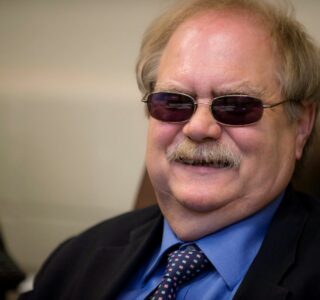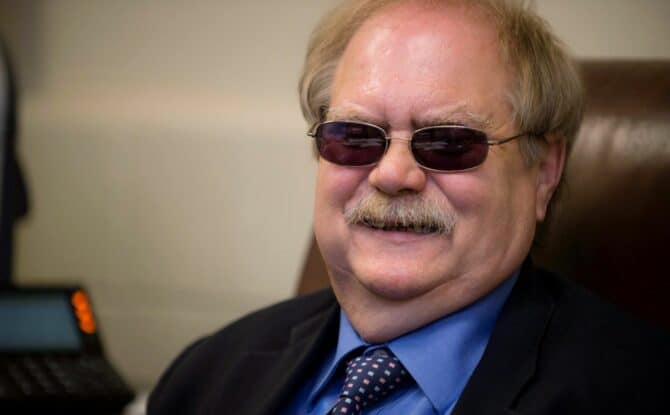
Senior VP of Public Policy Greg Polman Reflects on 40 Years of Prioritizing Accessibility
Employment for people with disabilities was an entirely different world when Greg Polman joined The Lighthouse in 1983. Accessible computer interfaces were just taking shape, audiobook recordings were available (but only from the government), digital technology was non-existent, and the passage of the Americans with Disabilities Act was nearly a decade away.
Still, The Lighthouse was committed to helping people who were blind or visually impaired live with confidence and independence, as was Greg, who had been working as a rehabilitation counselor for the state when The Lighthouse came calling. Greg went blind as a teenager, but he was able to finish college with accommodations, and he felt everyone should have those same opportunities.
“When I came in, I was able to build new avenues to employment and advocate for people to advance themselves in their careers and their lives,” Greg says. “I was brought in to help start [an accessible] technology center that would be an adjunct to The Lighthouse’s job placement programs. I did a lot of work facilitating job modifications and working with employers to help those with vision impairments.”
At the time, Greg was working under the Rehabilitation Acts of 1973 and 1974, an affirmative action program to ensure employment of people with disabilities by the federal government and federal contractors. In 1990, the United States adopted the Americans with Disabilities Act, which guaranteed access for people with disabilities in all areas of society, including employment. While the legislation was a huge step forward for disability rights, it required people with disabilities to use the court system to address accommodations (or lack thereof). “It had some effect, but it didn’t move the needle as significantly as we would have liked because of some of the ADA’s loopholes,” Greg says.
So, Greg, who at one point in his education wanted to become an attorney, turned his attention to public policy. Over the past 33 years, he has advocated for accommodations that provide access and inclusion throughout Chicago, including lobbying for curb cuts to facilitate wheelchair access, Braille signage at CTA bus stops, improving accessibility at Chicago’s airports, and (as a private citizen, not in his role at The Lighthouse) participating in a lawsuit against the City of Chicago to install more Assistive Pedestrian Signals.
As Greg reflects on 40 years of employment at The Lighthouse, this work is what he hopes will leave a lasting impression. “These types of things are important to make sure that you’re making it better for people who follow,” Greg says. “I’m proud of the fact that I’ve made significant differences for people who are blind or visually impaired and for the disabled community as a whole.”


